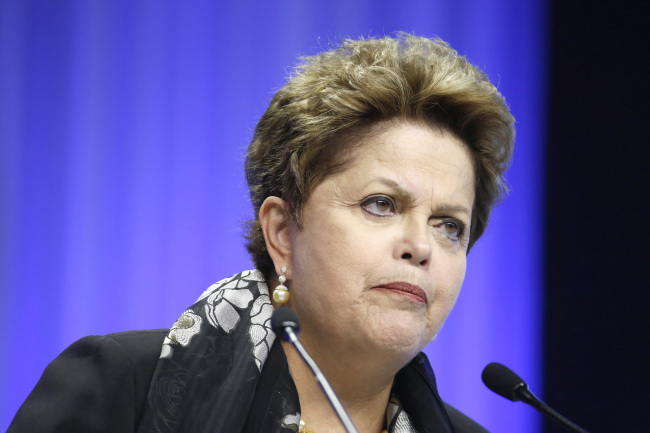For Rousseff, economy bigger issue than World Cup shame
By Korea HeraldPublished : July 10, 2014 - 20:58
BRASILIA (AFP) ― With elections looming, President Dilma Rousseff now faces Brazilians angry at their World Cup humiliation, but her bigger worry will be convincing voters she can jumpstart the economy.
Rousseff had promised Brazilians that they would see the “Cup of Cups” but they ended up witnessing their beloved national team’s elimination in an embarrassing 7-1 semifinal defeat to Germany at home on Tuesday.
The shocking defeat has brought a gloomy mood to a country that often confirms the cliche that “football is a religion.”
“Football is very important for Brazil and a defeat of this magnitude will deeply affect the nation’s spirit,” Luiz Antonio Machado, a sociologist at Rio De Janeiro State University, said.
But analysts say Rousseff’s hopes of reelection in October will depend on how voters feel about their pocketbooks, not a football match.
Rousseff had promised Brazilians that they would see the “Cup of Cups” but they ended up witnessing their beloved national team’s elimination in an embarrassing 7-1 semifinal defeat to Germany at home on Tuesday.
The shocking defeat has brought a gloomy mood to a country that often confirms the cliche that “football is a religion.”
“Football is very important for Brazil and a defeat of this magnitude will deeply affect the nation’s spirit,” Luiz Antonio Machado, a sociologist at Rio De Janeiro State University, said.
But analysts say Rousseff’s hopes of reelection in October will depend on how voters feel about their pocketbooks, not a football match.

The leftist president’s popularity has seen ups and downs in the past year, reaching lows when protests erupted last year over the record $11 billion spent to host the World Cup.
But she has a comfortable lead in opinion polls, with the most recent survey giving her 38 percent support compared to 20 percent for Social Democratic Sen. Aecio Neves and nine percent for socialist former governor Eduardo Campos.
Her popularity has risen in the past month thanks to the success of the tournament and the national team’s victories, but Tuesday’s devastating loss has ended the party mood in the street.
Many fans chanted obscenities against Rousseff at the Mineirao Stadium in Belo Horizonte, though she was absent. Similar insults were lodged at the opening game in Sao Paulo on June 12 ― that time in front of her.
She runs the risk of hearing more verbal abuse when she attends the final in Rio de Janeiro’s Maracana Stadium on Sunday to hand the trophy to the winner.
A protest has been called outside the stadium that day, but it’s unclear whether many people will turn out.
A few protests took place during the tournament, gathering just a few hundred people at most ― far fewer than the hundreds of thousands who flooded the streets during last year’s Confederations Cup, a World Cup dress rehearsal.
Brazilians have demanded better health care, education and public services in a country whose once blistering economic growth has slowed in recent years.
The World Cup defeat “can increase the criticism, change the mood,” said Humberto Dantas, a political science professor at the Education and Research Institute.
But Dantas voiced doubts that Brazil will see another round of massive demonstrations.
“Many protesters were students, and we are in the middle of school vacation. The violence committed by the police and many protesters scared a lot of people away,” he said.
Gilberto Carvalho, the administration’s cabinet chief, sought to separate the election from the tournament.
“The Cup is the Cup. The atmosphere will be different in August,” he said, according to O Estado de Sao Paulo newspaper.
“The moment of suffering is now, but the page will turn in August. As a government, we have to make clear that the (tournament’s) infrastructure worked perfectly. The elections are another chapter,” he said.
Joao Augusto de Castro Neves, Latin America director for the Eurasia Group political consultancy, said the World Cup would have little impact on the election.
“In the recent past, there are examples of teams who played well and presidents who weren’t doing well, and vice versa. There is no correlation” then or now, he said. “The biggest risk (this time) was the Cup’s organization and everything went well there.”
“The biggest risk for Rousseff in this election remains the economy, not the World Cup,” he added.
The economy is expected to grow by just one percent this year, the fourth consecutive year of meager output, according to the central bank.
Inflation reached 6.52 percent in the 12 months to June, higher than the 6.5 percent target ceiling. Higher airline and hotel prices during the tournament were blamed for the increase.
-
Articles by Korea Herald


![[AtoZ into Korean mind] Humor in Korea: Navigating the line between what's funny and not](http://res.heraldm.com/phpwas/restmb_idxmake.php?idx=644&simg=/content/image/2024/04/22/20240422050642_0.jpg&u=)
![[Exclusive] Korean military set to ban iPhones over 'security' concerns](http://res.heraldm.com/phpwas/restmb_idxmake.php?idx=644&simg=/content/image/2024/04/23/20240423050599_0.jpg&u=20240423183955)


![[Graphic News] 77% of young Koreans still financially dependent](http://res.heraldm.com/phpwas/restmb_idxmake.php?idx=644&simg=/content/image/2024/04/22/20240422050762_0.gif&u=)

![[Herald Interview] Why Toss invited hackers to penetrate its system](http://res.heraldm.com/phpwas/restmb_idxmake.php?idx=644&simg=/content/image/2024/04/22/20240422050569_0.jpg&u=20240422150649)






![[Exclusive] Korean military to ban iPhones over security issues](http://res.heraldm.com/phpwas/restmb_idxmake.php?idx=652&simg=/content/image/2024/04/23/20240423050599_0.jpg&u=20240423183955)



![[Today’s K-pop] Ateez confirms US tour details](http://res.heraldm.com/phpwas/restmb_idxmake.php?idx=642&simg=/content/image/2024/04/23/20240423050700_0.jpg&u=)